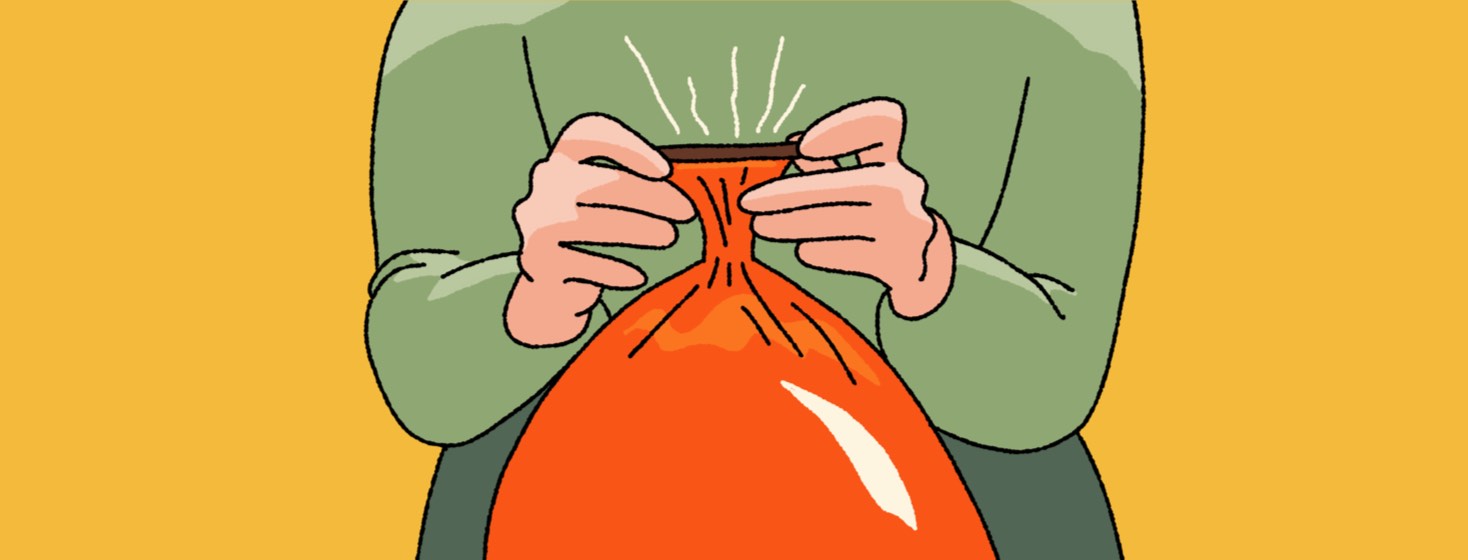Colitis, Gas, and Bloating
Recently, I began wondering...could there be a connection between my ulcerative colitis and my gas and bloating?
In the morning, I'm skinny. Well, I'm not rail-thin skinny. I've never been that size. Overall, I'm just an average-sized female.
But I wonder... Why can't I stay that size all day long? When I first wake up, I feel comfortable in my clothes. They're usually not too tight. I leave for work feeling... well, normal.
Then, by the end of my workday, I'm ready to rip off all my clothes. They're way too tight and cutting off my circulation. Why is this? I watch my sodium intake. And, to be honest, I don't eat that much food over the course of my day.
Why the gas pain and bloating with ulcerative colitis?
Since I'm not scheduled to see my GI, I thought I would do a little "research." Yep, you guessed it, I began Googling. What I quickly discovered made sense. People with IBD, such as Crohn's disease and ulcerative colitis, possess intestinal inflammation, which lends itself to producing gas and bloating. When the intestines struggle to break down food properly, bacteria along the intestinal lining attempt to. This effect can cause more gas.
Now, I don't fully understand all the medical reasoning behind the bacterial breakdown of food in my intestines. But what I do grasp is that colitis patients have a more difficult time breaking down gas because of bowel lining inflammation.
Add to this information, I am also a vegetarian. That means my intake of gas-producing foods is higher than one whose diet doesn't center on fruits and vegetables. So, what should a vegetarian with UC do?
Based on the many articles I read about IBD and gas, I need to rethink the way I eat, the way I drink, and the amount of talking I do.
How can I reduce gas and bloating?
Talk less?
First, let me address all the air I'm ingesting through talking. As a school teacher, cutting back on verbal communication might be a problem. I can just envision a less talkative me in the classroom. Instead of opening my mouth, I could just stand at the front of my class, message my students through the computer, and point at assignments for them to do. No mouth movements. Just type, click, and point.
Nooo... That won't happen. Rambunctious 9th grade students are like 1,000 kittens needing guidance and direction. As much as my students might prefer a less chatty me, I just don't have it in me to keep quiet. I didn't come into this world with my mouth closed. It's not going to happen now.
So, let's move on to another gas prevention tactic.
When and how I eat?
Could I eat smaller meals more frequently instead of larger meals? Yes, I could try to eat 6 small "meals." Still, that's challenging as a teacher. I don't want to eat in front of my students, but I might find out a way around it.
I'm envisioning cramming down apples and bananas during the 4-minute class changes. Okay...that's also not a workable scenario.
Could I avoid foods that my gut is sensitive to? Absolutely! Gluten and lactose are nasty buggers that my gut cannot handle. So, I don't include them in my diet.
Could I also eat more slowly with my mouth closed? Yes, and I'm working on this one. I know that digestion is said to be better for those who chew eat bite thoroughly. I'll work on this suggestion.
What I drink?
Could I cut out my fizzy drinks that are gas-producing? Absolutely. I don't need carbonated beverages. I can be content with water only...on most days. Besides, I know that carbonated beverages and my colitis dragon just don’t play well together. The gut pain has proven this over the years. (Note to self: Drink more water.)
Also, taking smaller sips rather than gulping down a drink is also better for my digestion. (Additional note to self: Drink more water more slowly. Got it!)
Plus more ways to avoid gas pain and bloating
Could I also avoid high-fat and high-sugar foods? As a vegetarian, I don't ingest much fat, but I sure get lured into sugar. Maybe I could cut down on my sweet treats that I reward myself with on stressful days. Instead of reaching for M&Ms, I suppose I could take a walk outside when the chocolate temptation strikes. (Extra note to self: This managing of gas and bloating is TOUGH business! Goodbye, sweet treats? Sniffle. Sniffle.)
Other notes of interest for avoiding my nasty bloat include avoiding gum, avoiding long periods of sitting, and taking more walks to move digested food and air around intestinally.
Caring for my UC gut
Now that I'm more informed, it's time for me to go grab some water and get moving. While I'm heading out to do that, I think I'll also grab some Gas-X.
Relieving pressure and pain in my gut is important when suffering from IBD. With an inflamed digestive system, other issues can creep up like hormonal imbalances, mood disorders, and other autoimmune issues.
Overall, my goal is to improve my health. Understanding my gas and bloating triggers will help. Besides, my clothes just might fit better at the end of the workday if I implement some changes. And for that alone, maybe I can breathe a little easier.

Join the conversation